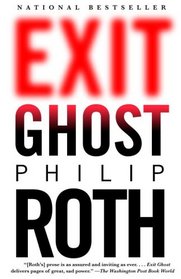Nathan Zuckerman, Roths alter ego, is still at it. My first thought, upon reading an excerpt from the opening chapter, was I have prostate problems of my own; why do I want to read about Zuckermans? Although Zuckermans medical difficulties with incontinence, brought about by radical prostatectomy, permeate the novel, his lambasting of the Republican leadership, back as far as Nixon, and his diatribe of the GOP (Grand Ole Ps) and Texas make this a must read. Bush is particularly trashed: Caligula wins, one of the characters quotes. Much of the plot is triggered around now dead and long-forgotten E. I. Lonoff, a fictional writer of short story fiction: a reversion to The Ghost Writer. Lonoff, it is said, is based upon Roths spiritual apprenticeship with Bernard Malamud. Somehow a journalist wants to write Lonoffs biography: something that all other characters want over their own dead body. True to the tradition of several modern Jewish writers, sexual innuendo pervades much of the novel, to wit regurgitation of acts still illegal in some states. While there is much name dropping of classic authors and their works, references to Conrads The Shadow-Line punctuate the novel. Nathan takes the story with him to New York, where he is seeking collagen treatment for incontinence. The author postulates that in the Shadow-Line Conrad writes in triplets. Are there triplets in Exit Ghost? With Amy? Jamie? Kliman? His collagen treatments? He dwells on the opening reference to rash moments, which also happens to be the title of the last chapter of Roths novel. Nathan discusses this with a female author, about whom he constantly fantasizes of a spring-winter relationship, and for whom he experiences his own rash moment. At the end he fantasizes her rash moment. As Nathan rushes back to the Berkshires, has the ghost made a final exit?
Search -
Exit Ghost (Vintage International)
Exit Ghost - Vintage International
Author:
Alone in his New England mountain, Nathan Zukerman had been nothing but a writer: no voices, no media, no terrorist threats, no women, and no news. — Now, back in New York City, walking the streets like a revenant, he quickly makes three connections that explode his carefully protected solitude. Suddenly involved, as he never wanted or intended... more »
Author:
Alone in his New England mountain, Nathan Zukerman had been nothing but a writer: no voices, no media, no terrorist threats, no women, and no news. — Now, back in New York City, walking the streets like a revenant, he quickly makes three connections that explode his carefully protected solitude. Suddenly involved, as he never wanted or intended... more »
ISBN-13: 9780307387295
ISBN-10: 0307387291
Publication Date: 11/11/2008
Pages: 304
Rating: 1
ISBN-10: 0307387291
Publication Date: 11/11/2008
Pages: 304
Rating: 1
2.5 stars, based on 1 rating
Please Log in to Rate these Book Reviews
Genres:





